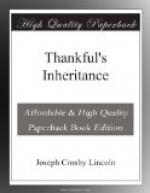“I suppose you’re thinkin’ about that brother of yours,” suggested Mr. Hammond. “Well, he’ll be all right. ‘Cordin’ to what I’ve heard, and seen myself, he’s hangin’ around that hired help girl at the High Cliff pretty reg’lar these days. Maybe he’ll marry her and you’ll be left without anybody. If he don’t marry her he can come to live along of us—maybe. If he does he’ll mind his p’s and q’s, I tell you that. He’ll find out who’s boss.”
This speech had an effect. For the first time Hannah’s determination wavered. Kenelm was, although Caleb did not know it, actually engaged to marry Imogene. His sister was even then writhing under the humiliation. And here was an opportunity to get even, not only with Kenelm, but with the “inmate.” If she, Hannah, were to marry and leave the pair instead of being herself left! Oh, the glory of it—the triumphant glory of it! How she could crush her brother! How she could gloat over and sneer at Imogene! The things she might say—she, the wife of a rich man! Oh, wonderful!
“Well, come on, Hannah, come on,” urged the impatient Caleb. “What do you say?”
But Miss Parker still shook her head. “It ain’t any use, Caleb,” she declared. “Even if—if I wanted to, how could I tell Kenelm? He’d raise an awful fuss. He’d tell everybody and they—”
“No, he wouldn’t. I’d break his neck if he did. . . . And—eh—” as another idea came to him, “he needn’t know till ’twas all over. We could get married right off now, and not tell a soul—Kenelm or anybody else—till it was done. Then they could talk or shut up, we wouldn’t care. They couldn’t change nothin’.”
“Caleb Hammond, do you suppose I’d have the face to go to a minister in this town and have you tell him we’d come to get married? I’d be so ashamed—”
“Hold on! We don’t have to go to a minister in this town. There’s other towns with parsons in them, ain’t they? We could drive over somewheres else.”
“Everybody’d see us drivin’ together.”
“What of it? They see us drivin’ to the Cattle Show together, didn’t they?”
“Yes, and they’ve talked about it ever since, some of ’em. That Abbie Larkin said—Oh, I can’t tell you what she said. No, I shan’t do it. I shouldn’t have the face. And everybody’d ask where we was bound, and I’d—I’d be so—so mortified and—and—why, I’d act like a reg’lar—er—er—domicile that had run away from the Idiots’ Home. No, no, no! I couldn’t.”
Mr. Hammond thought it over. Then he said:
“See here, Hannah, I cal’late we can fix that. We’ll start in the night, after all hands have gone to bed. I’ll sneak out about quarter to twelve and borrow Thankful’s horse and buggy out of her barn. I know where she keeps the key. I’ll be ready here at twelve prompt—or not here, maybe, but down in the hollow back of your henhouse. You must be there and we’ll drive over to Trumet—”
“Trumet! Why, Caleb Hammond, I know everybody in Trumet well’s I do here. And gettin’ to Trumet at three o’clock in the mornin’ would be—”




